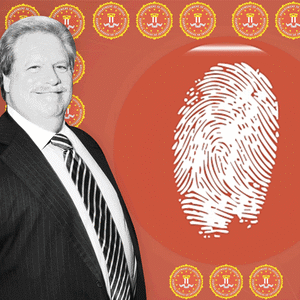It’s said the CIA used to plant recording devices under the first class seats of Air France to listen for any Champagne-lubricated entrepreneur’s mid-flight disclosure that his company had just used bribery to beat an American competitor.
We all know about the NSA’s eavesdropping on Angela Merkel’s cell phone conversations (not to mention listening in on German reporters getting leaked intel). Spying between friends “just isn’t on,” an angry chancellor told the Obama administration in 2015.
Except that it is on and always has been on and depends greatly on one’s fluctuating definition of friends.
Consider the curious case of Qatar’s state-sponsored hackers attempting to penetrate the emails of prominent U.S.-based members of the Syrian opposition. This disclosure, as first reported by Bloomberg and The New York Times, came via a lawsuit filed by former Republican financier and Trump affiliate Elliott Broidy, who himself was hacked and then exposed for engaging in that perennial American business of trading access to the White House for personal gain.
BROIDY'S LAWYERS SUBPOENAED TinyUrl.com, a link-shortening website used to mask the domains involved in spear-phishing him and other targets, which is to say sending deceptive emails designed to lure them into entering their email passwords on a fake website run by the hackers.
TinyUrl provided a staggering 11,000 pages of websites and emails used to try and snag some 1,200 targets over a one-year period, from June 1, 2017 to May 31, 2018, according to data seen by The Daily Beast. (More people might have been targeted before or after those dates.)
“It is extremely unlikely that private individuals can have done this,” a digital forensics expert familiar with the data told me, pointing the finger at Doha.
Jassim Bin Mansour Al-Thani, the media attaché at the Qatari embassy in Washington, D.C., didn’t so much deny the charges as cast doubt on them. They were, he told the Times, “weak supposition and conjecture.”
Most of the 1,200 marks were, as you’d expect, outspoken enemies of the tiny, gas-rich emirate in the Gulf, although a few targets in the data set seemed to be off-contract labors of love, such as Bollywood actresses whom the hackers just might have fancied.
The more obvious targets residing in the United States and Europe had easily Google-able public records making statements against Qatar or had been employed by Saudi Arabia, the United Arab Emirates, or Bahrain to do contract or lobbying work in the West.
Those living in the Middle East included royalty or government officials from those same three countries, which have been engaged in a year-long blockade of Qatar owing to its foreign policy adventurism; namely, its outward support for the Muslim Brotherhood as a political organization in Egypt and Gaza and for its underwriting of various Islamist rebel groups in Libya and Syria, not to mention its powerful Al Jazeera satellite news network.
The Al-Thani monarchy’s perceived softness toward its regional Shia-led adversary, Iran, also factors into this not-so-cold war waged by Saudi Crown Prince Mohammed bin Salman.
The Trump administration has sided with the Saudi bloc on the matter, which is presumably one reason Broidy, a liaison tilting administration policy toward Riyadh and Abu Dhabi, was hacked. Ditto former CIA and Dutch intelligence officials now in the private sector working for companies with Saudi or Emirati contracts.
But why go after the stateless and increasingly marginalized Syrian opposition?
Qatar is a charter member in the so-called Friends of Syria coalition put together by Washington to isolate Bashar al-Assad’s regime. Since 2011, the Qatari state-run news channel Al Jazeera has waged a tireless media campaign exposing the regime’s war crimes and crimes against humanity, and some of the Syrians targeted have even appeared on the network’s English and Arabic channels.
Here, again, it all depends on how you define friends.
“WITHIN SYRIAN ACTIVIST CIRCLES I’ve been outspoken against Islamists in general, and against the Muslim Brotherhood in particular,” says Kenan Rahmani, advocacy manager for the human rights group The Syria Campaign, whose Gmail account was unsuccessfully spear-phished by the Qataris. “I didn’t realize that would cause Qatar to view me as an adversary.”
Wael Sawah, a member of the Board of Directors of the Syrian Center for Media and Freedom of Expression, and a Syria scholar, told me he was stumped as to why he’d be on Doha’s hit-list. “I have no clue. I’m a dissident of the Assad family. I had to leave Syria because of that. I am not in any contact with any regional government or state actors. I’m not in contact with any non-state actor in the Gulf. I’ve never interfered in Gulfie affairs.”
Others in Syria opposition politics say the Qataris wanted to keep an eye on what other governments they might be talking to. One targeted activist who agreed to speak to The Daily Beast on background said that he might be under suspicion because of his meetings with the Trump administration, including the National Security Council.
Sasha Ghosh Simonoff isn’t even Syrian (he’s Jewish with dual U.S.-Canadian citizenship), but he was nevertheless on the list, apparently owing to his work over the years for a variety of Syrian dissident groups, including the Syrian Emergency Task Force. Today he collaborates with Bassam Barabandi, an ex-diplomat formerly posted to the Syrian embassy in Washington, D.C. who, after helping smuggle his compatriots out of the war-torn country by issuing their U.S.-based family members passports, defected to the opposition and now lives in Washington, D.C. Barabandi was also targeted by the hackers but declined to comment for this article.
“Bassam and I both communicate with the Turkish government,” Ghosh Simonoff told me. “So perhaps [the hackers] were more interested in how we were discussing the Syrian opposition and trying to understand what Qatar's involvement is, specifically their connection to Jabhat al-Nusra and HTS,” he said, referring to the alternate names for the al-Qaeda affiliate in Syria. “In the past Qatar has facilitated the release of people who were kidnapped by either Nusra or HTS and I myself have been privy to some of the details of those kidnappings because I know the meditators who helped on the Syrian side.”
Qatar has also reportedly paid at least $770 million, and as much as $1 billion, to secure the release of 26 members of its royal family who were kidnapped by an Iranian-backed Shia militia group while falconing in Iraq. Four towns in Syria, two Sunni-majority and two Shia-majority, were also tossed onto the bargaining table in a deal that culminated in releasing the falconers, brokered on the one side by Lebanese Hezbollah and Iran and on the other by the Al-Thani family and Ahrar al-Sham, a powerful Salafist rebel faction in Syria.
“Every time we follow a deal between Iran or pro-Iran militias and Islamic extremists in Syria,” said one analyst of the conflict, requesting anonymity, ”we find Qatari money.”
Ironically, Ghosh Simonoff said, his first job for the opposition was in digital security. “I helped train Syrians to avoid cybertraps laid by the [Assad] regime or the Iranians. I never thought we’d also have to worry about the Qataris.”







